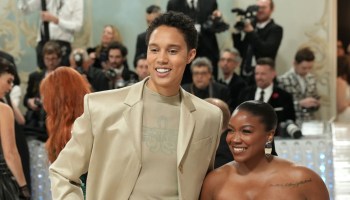A year ago, Tim Story’s filmmaking career was in deep freeze. Even though the director had enjoyed a groundbreaking hit in 2002 with “Barbershop” and had a pair of successful “Fantastic Four” superhero movies, he ran aground in 2008 when he directed “Hurricane Season,” an inspirational drama about a high-school basketball coach whose ragtag team wins the state championship. The film’s backer, the Weinstein Co., never released it in theaters and sent it straight to video.
But Story now has a ragtag success story of his own. His latest film, “Think Like a Man,” made on a meager $12-million budget, is now a significant comedy hit, having grossed $82 million domestically in its first 24 days of release. Making a comedy with a 7-to-1 box-office-to-budget ratio is a rare feat indeed, the kind of success that normally catapults a director onto the A-list of comedy filmmakers.
But when I sat down with Story the other day, I was still concerned about his future. He has one big strike against him. He’s African American, and the Hollywood laugh factory is still a very segregated world.
Consider this: Of today’s top comedians — by which I mean Adam Sandler, Will Ferrell, Steve Carell, Ben Stiller, Jack Black, Kevin James, Vince Vaughn, Seth Rogen, Sacha Baron Cohen and Zach Galifianakis — guess how many of their starring roles have been in a comedy directed by an African American?
Zero.
There are a handful of black directors who’ve had comedy hits with largely African American casts, notably Tyler Perry, the Wayans brothers and Malcolm Lee. There are white comedy filmmakers who’ve had hits with black headliners (Steve Carr, for instance, has worked with Ice Cube and Eddie Murphy). But today’s top white comedy stars have only worked with white filmmakers.
Though Story, 42, would like to have a shot at changing that equation, he is hardly a Spike Lee-style crusader. In fact, when I asked him about his biggest influences, he picked the same names you’d hear from any white filmmaker of his generation.
“First off, I love Woody Allen,” he said, sharing an order of French fries with me at a local eatery. “His early movies, like ‘Hannah and Her Sisters,’ are incredible. I also love anything by Billy Wilder, Ron Howard and John Hughes. I really grew up on the Hughes films, which are the ones I go back and watch all the time, just to see how they were put together. And I’d say Rob Reiner’s ‘When Harry Met Sally’ is my all-time favorite. It made me realize there’s a way of telling a story where the audience is so in love with the characters that they forget you’re even telling a story.”
You can say the same thing about “Think Like a Man,” a shrewdly assembled ensemble comedy that is so full of engaging character turns and raucous comedy set pieces that you hardly notice its thin story line. The gifted cast is largely African American, but judging from the night I saw the film, it plays just as well with whites and Latinos as black moviegoers.
The movie, released by Sony’s Screen Gems, has put Story back on the map. He’s taking meetings with top executives at studios including Warners, DreamWorks, MGM and Lionsgate. The good news is that the projects he’s being offered aren’t just black character comedies. Having made a pair of superhero films that required a lot of visual effects, Story has the credentials to helm an action comedy or a buddy picture, two of the most popular studio comedy subgenres.
But he’s still working at a disadvantage because he’s a black filmmaker at a time when the people who run today’s studios are overwhelmingly white and not especially well-versed or even particularly curious about African American culture. After “Think Like a Man” opened at No. 1, one studio president decided not to mention the film during the studio’s Monday morning production meeting, curious to see how long it would take to surface as a topic of conversation.
Fifteen minutes into the meeting, no one had mentioned the film. When the studio boss finally brought it up, asking who had seen it over the weekend, the room was silent. None of the all-white staff had bothered to go see it.
This is the cultural chasm that confronts all African American filmmakers.
But the world of comedy is especially insular. To hear insiders tell it, comedy’s top stars don’t work with African American filmmakers because they rarely interact with anyone that isn’t already a member of their very cliquish club. And even though Story has now directed several big hits, those credentials matter little in the comedy universe, the one area in Hollywood that is still ruled by star talent.
“There’s a uniform lack of respect for comedy directors,” says one top producer, citing go-to Adam Sandler director Dennis Dugan as an example. “Dugan’s movies have made hundreds of millions of dollars, but everyone looks at him as a hired hand. The only filmmakers who matter are writer-directors like Judd Apatow or Todd Phillips. If you’ve ever been on an Adam Sandler set, you’d assume that the director was Sandler’s personal assistant, not the guy making the movie.”
Comedy is a very tribal world filled with insecure stars who, except perhaps for Sandler, never know if their new film is going to be a smash or a flop. This breeds a high level of fear and anxiety that inspires most comics to seek out filmmakers who know how many ice cubes they want in their Diet Coke. For comics, having a director who puts them in their comfort zone is more important than the director’s filmmaking skills.
Story says the biggest challenge for him is simply access. “It’s definitely about exposure,” he says. “I did get into the room with Kevin James when he was going to do ‘Paul Blart: Mall Cop’ and I think my biggest drawback with the studio was that they were worried that I couldn’t bring the movie in on a small budget, since I was coming off a ‘Fantastic Four’ movie that cost $120 million.”
Story isn’t complaining. “I believe that if I can get in the room with talent, I will come so prepared and have such a strong point of view that I’ll impress them. All I want is the same opportunities as the filmmakers I grew up admiring. But you know, I’ve had lots of amazing opportunities to do the movies I wanted to do. If I could write my future, I’d want to keep making character-based films that can make use of my voice as a filmmaker.”
Read more at La Times Blog














